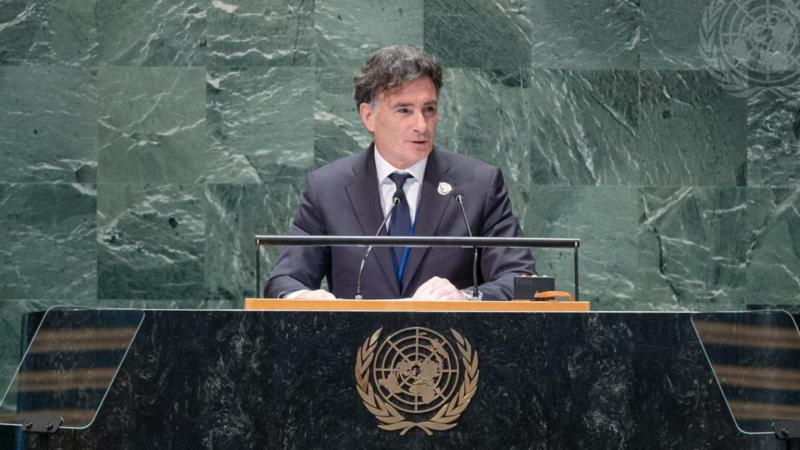
19 APR 2024 · ENVIRONMENT
During the UN’s first annual Sustainability Week, IRU’s Secretary General outlined key actions to continue advancing the sustainability of road transport and its role in global development.
How do we leverage the social inclusivity and sustainability of road transport to achieve the UN 2030 Agenda for Sustainable Development?
That’s the question IRU Secretary General Umberto de Pretto tackled at the UN General Assembly this week in New York.
“Transport keeps us fed, healthy and supplied with the essentials of life. It brings us to our workplace and connects us with our loved ones. It is essential to the lives and livelihoods of all eight billion people that we share this planet with.
“All modes of transport must work together to get people and goods to their destinations. They must all become greener and proactively support social inclusion, especially for the poorest communities in our world.
“Greening transport is a marathon, not a sprint. We cannot wait for 2050 and then press a ‘magic button’. We need to pursue a mix of different policies in parallel – right now.
“Pragmatic efficiency measures – like longer vehicles, better route optimisation and driver training – may be less exciting than new fuel technologies, but if we are more efficient, we are greener. With the right enabling environment, legislation and incentives, we can already reduce our carbon footprint by 50%.”
The IRU Green Compact, a collective global roadmap to achieve carbon neutrality in commercial road transport by 2050, has found that pragmatic efficiency measures are key to decarbonisation efforts, as important as alternative fuels over the short and long term.
Umberto de Pretto also emphasised the crucial role of tried-and-test UN trade tools in improving not only the efficiency of transit and transport but also its sustainability.
“How can trucks inching forward at borders for hours, days and even weeks – while emitting carbon emissions – be sustainable? We have tools such as the UN TIR Convention that has worked for over seven decades. Real live transport operations show that streamlining border crossings using the TIR system reduces the carbon emissions of a cross-border journey by up to 30%,” highlighted Umberto de Pretto.
“We need to maximise the power of the instruments at our disposal. Any country not part of the TIR system must accelerate its accession and implementation. Governments don’t need to reinvent the wheel. Just rather look at what has been working for decades,” he added.
What else needs to be done?
Looking forward to the UN Decade of Sustainable Transport, Umberto de Pretto detailed three specific suggestions:
Firstly, the UN Department of Economic and Social Affairs Expert Group Meeting on Sustainable Transport, which consists of representative stakeholders, should become an annual event to share experiences, best practices, successes and failures for the Decade of Action for Sustainable Transport.
Secondly, the number of ratified and implemented UN Conventions, such as TIR, CMR and ADR, should be used as key indicators to monitor progress.
Thirdly, there is no one-size-fits-all solution. Public-private cooperation is required to implement pragmatic regional and local pathways to carbon neutrality. The IRU Green Compact is based on regional flexibility in terms of evidence gathering, testing and scaling up of solutions.
Umberto de Pretto concluded, “IRU looks forward to playing an active role in the UN Decade of Sustainable Transport. We, together with governments, need to pursue all measures available to ensure that decarbonisation does not compromise the key role of transport in economic and social development.”


